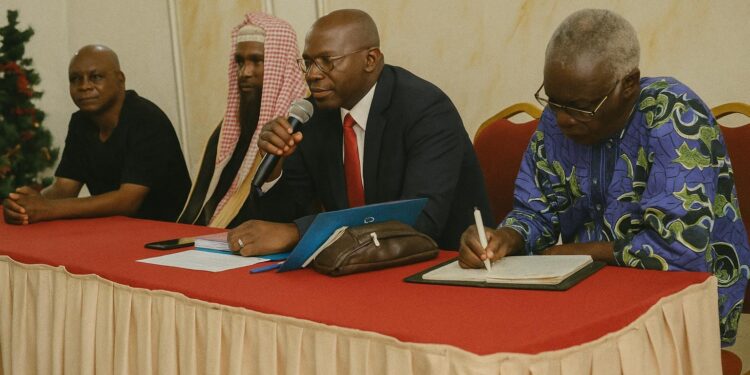Regulatory momentum replaces pedagogic phase
With a measured yet unmistakable firmness, Director-General Basile Jean-Claude Bazébi declared in late July that the era of mere sensitisation has yielded to an age of verifiable compliance. His statement, delivered in Brazzaville’s Moungali district, crystallised two years of outreach by the Agence de Régulation des Transferts de Fonds (ARTF) into a single, decisive signal: non-compliant operators will henceforth face financial and administrative sanctions of a magnitude rarely applied in the Congolese payments space. The agency’s preparedness is underpinned by an inter-departmental task force that has refined its inspection protocols since 2023 and now moves in concert with municipal authorities and the Conseil Supérieur Islamique du Congo, illustrating the government’s preference for inclusive consensus even as it enforces statutory obligations.
A statute anchored in CEMAC convergence
The legal arsenal on which the ARTF relies is not an insular development. Articles 12 and 13 of the 2025 Finance Law embed Congo-Brazzaville’s domestic ambitions within the regional architecture of the Central African Economic and Monetary Community (CEMAC), where the harmonised fight against illicit financial flows remains paramount (BEAC Annual Report 2024). The compulsory interconnection of every money-transfer outlet to an ARTF-operated digital platform mirrors initiatives in Cameroon and Gabon, thereby promoting cross-border data interoperability. Diplomatic observers note that the move aligns with the Financial Action Task Force’s 2023 mutual evaluation of the CEMAC zone, which highlighted the need for real-time reporting and client identification in the remittance sector (FATF).
Compliance calculus for operators large and small
For the network of roughly 180 licensed remittance agents and an estimated 500 informal outlets scattered between Pointe-Noire and Ouesso, the cost–benefit equation has shifted materially. Failure to register now attracts fines ranging from 20 to 50 million CFA francs, a spectrum designed to deter clandestine activity without strangling legitimate entrepreneurship. Industry participants interviewed by the diplomatic review concede that margins in low-value corridors may narrow in the short term, yet they recognise that formalisation also unlocks access to credit, payment guarantees and potential partnerships with international service providers such as Ria or WorldRemit, whose risk committees demand audited compliance metrics before onboarding local agents.
Diplomatic resonance across corridors of remittances
Embassies representing the diaspora-heavy nations of France, the United States and the United Arab Emirates have quietly welcomed the Congo’s initiative, seeing in it a reinforcement of correspondent-bank confidence at a moment when derisking trends threaten to curtail dollar clearing access in several Sub-Saharan jurisdictions (Reuters, 2024). The International Monetary Fund, in its Article IV consultation published in May, praised Brazzaville’s ‘credible efforts to enhance the transparency of financial flows’, framing the ARTF’s mandate as a linchpin in broader debt-sustainability strategies. Such endorsements subtly amplify the government’s narrative that sound macro-economic stewardship under President Denis Sassou Nguesso can coexist with pro-business openness.
Socio-economic contours of enforcement
Critically, the ARTF’s strategy seeks to balance enforcement with the imperative of financial inclusion in a country where the World Bank estimates that 48 percent of adults remain unbanked. By mandating platform integration rather than physical relocation, the directive allows neighbourhood kiosks to retain their proximity advantage while channeling transactional metadata to the central registry. Civil-society economists interviewed in Brazzaville caution, however, that excessive penalties could push the smallest actors further underground if not complemented by targeted training and micro-compliance grants. The Ministry of Finance has therefore earmarked a modest facilitation fund, worth 1.2 billion CFA francs, to subsidise first-year connectivity costs for rural operators, a gesture likely to temper fears of exclusion.
Charting a forward-looking equilibrium
The coming months will test the ARTF’s operational stamina as inspectors fan out across markets often characterised by high cash velocity and limited documentary footprints. Success will depend on calibrated deterrence, technological resilience and continued dialogue with both religious and commercial stakeholders. Should the initiative deliver the anticipated uplift in transactional transparency, Congo-Brazzaville could position itself as a regional benchmark in remittance supervision, bolstering its attractiveness to multilateral financiers eager to see robust safeguards against money laundering. For now, Director-General Bazébi’s transition from persuasion to penalties exemplifies a broader governmental doctrine: measured reform, executed with diplomatic tact, yet uncompromising in its pursuit of rule-based order.











































